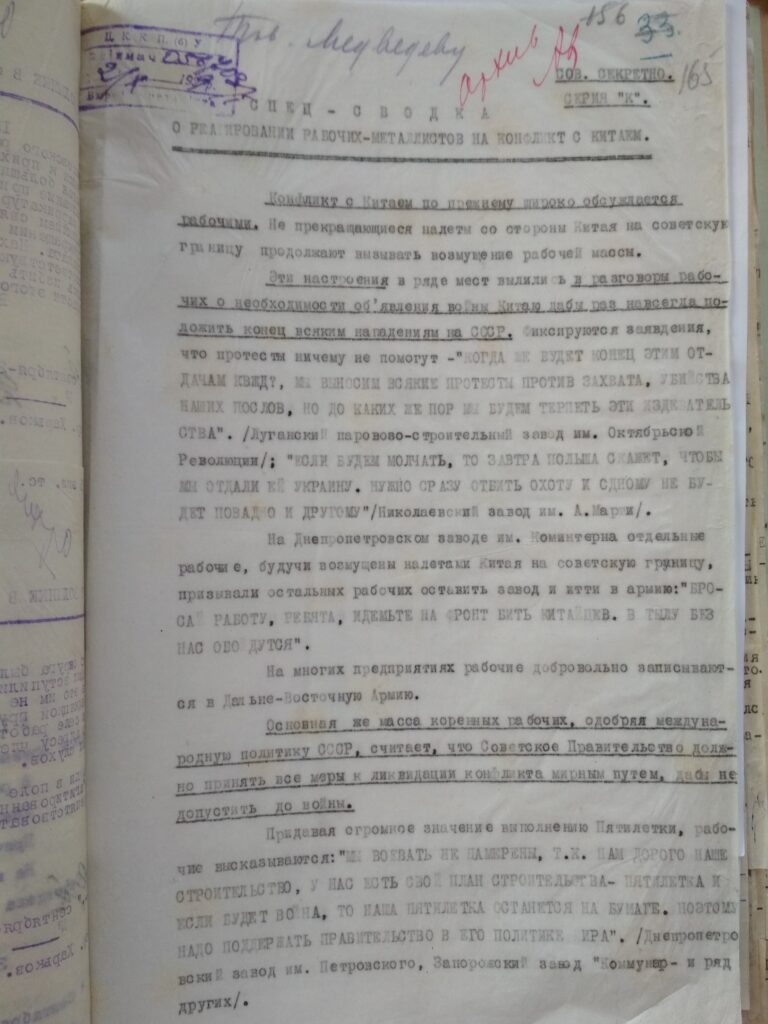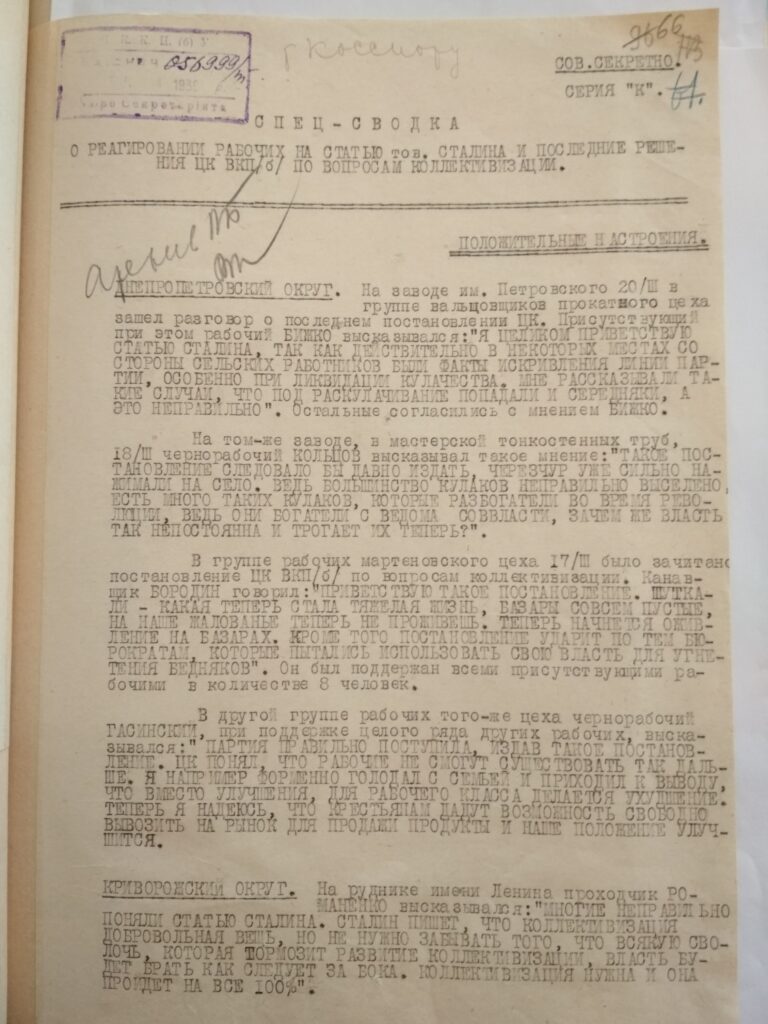[p. 293-297]
3
There is no unemployment in Soviet Russia—is the familiar line of the Communists in America and other foreign lands. What are the facts? At the Kharkov Tractor Plant there was not a day that I did not see large groups of people waiting outside of the gates looking for work. When a man was taken on, he had to go through a great deal of investigation. The applicant had to answer where he worked before and why he left his job. Were his parents workers or dirt farmers? Had they come from “kulak” stock? Had the applicant left a collective farm of his own free will? Many hungry wanderers looked for work at the plant. Most of them were turned away, particularly those who came from collectives. I remember one old man, ragged and freezing, begging for a job. Being hungry he was ready to do anything. He pestered the young official who did the hiring. “Go away, old man,” said our young Communist bureaucrat, “go to the field and die!”
As the old man silently and quiveringly turned away and walked down the ice-covered road, the young man’s eyes followed him with contempt. “It’s time we put these old people out of the way,” he remarked.
The Tractor Plant, one of the glories of the “workers’ fatherland,” is surrounded by a high brick wall. Every entrance is guarded by a soldier with loaded rifle and fixed bayonet. In addition there are watchmen at the entrances to the factory grounds. To get in one must show a pass. Every person entering the plant, including all the workers, must have a pass with the bearer’s photograph on it, stamped and signed by the chiefs of the factory G.P.U. Only guided tourists are excepted from this rule. A worker has a hard time getting to his job if, by accident, he leaves his pass at home, or, what is much worse, if he loses it. In the latter case, he has to be hired all over again. I have seen men, old plant workers, pleading with the guard for a chance to get to their jobs, panicky lest they lose their food allowance for that day. Every few months, the administration changes the type of pass and every worker and employee must get a new identification card. This unusual passport system was devised to enchain the workers and restrict them to certain zones. On the whole, it has accomplished the purpose of forcing the men to stay on their jobs regardless of working conditions. Thus, a worker in Kharkov having a passport good only for that zone, could not get a job if he moved, for instance, to Rostov or Stalingrad.
We had a school attached to the plant in which “engineers” were turned out by the dozen. These engineers, supposedly picked for unusual ability or political loyalty, would be rushed through the courses and let loose upon the factory as highly qualified men. They would attempt at once to correct the work of the foreign specialists, bringing untold confusion and wrecking the activities of the really able technicians. Fine and expensive machinery was ruined because of the total incompetence of these novices who had been put in positions of authority. Production was hampered time and again. Parts made of inferior metal would quickly wear out. Makeshift belts would quickly go to pieces. Measurements would be wrong. The average tractor sent out from the plant had a very short life. There were spasms when production slowed down to practically nothing. The same system prevailed in other great plants all over the country. But on paper the results somehow looked impressive. The industrialization of the Soviet Union appeared to be going ahead by leaps and bounds, and helped to disguise the appalling starvation and enslavement of the great masses.
4
Wherever I went in the Ukraine, I saw thousands of homeless outcasts about the streets with great watery blisters on their feet and ankles resulting from diseases of malnutrition. I would see them sit down on the ground and prick these blisters to let out water and then get up and drag themselves about their begging. Of course, they stole anything they could lay their hands on and the factories, whose workers had planted vegetable gardens and cabbage patches to supplement their own slim rations, would be compelled to post guards with orders to shoot to kill these pitiable foragers. In some instances they waylaid, robbed and killed some better-faring compatriot in the dark, but they were usually deterred from this sort of thing by the thought of some awful retaliation of the G.P.U. I saw this state of things in Kharkov. I saw it in Odessa, Kiev and other cities. The condition existed all over the southern part of the U.S.S.R. All these people were called “kulaks,” and the government slogan was: “Liquidate the kulak!” They were not allowed to have passports. They were not allowed to ride trains. They were not allowed to have jobs in the factories because the factory authorities could not feed them, although the official reason was that “they might wreck the machinery.” The Soviet Government had further given orders that no one might feed these runaway peasants. Such is the spell of fanatical propaganda coupled with unparalleled terror that the workers in the cities, themselves living on the lowest of rations and under nigh unbearable living conditions, would often denounce these peasants to the G.P.U. But they continued to run away from the collectives by the millions. They robbed freight trains. They plundered cooperative stores for food. The Central Committee of the Communist Party issued orders and decrees, threatening these “anti-social” elements with “the highest measure of social defense”—capital punishment.
The starving peasants and workers stormed the foreign colony at the Kharkov Tractor Plant every day. With piteous cries for food, they went from house to house and from door to door whenever they could get past the guards stationed there. It was the only hope of getting bread. There was none on the land. The Stalin clique was determined, however, to teach the famine-stricken people “a lesson in Communist dictatorship.” These crowds of roving peasants were augmented by discharged workers from factories, workers who couldn’t keep up with the Stalin pace or who had grumbled, protested, or fallen into disfavor with their overseers. For a worker to get fired in Soviet Russia means death by starvation, unless he can learn the art of begging or is fortunate enough to have some kind relative in the capitalist countries. For when a worker is fired, he loses his work-card. And when he loses his work-card, he loses his bread-card and the right to live in the government-owned houses or barracks. The discharged worker cannot depend on help from friends who have barely enough food for their own existence. Besides, the G.P.U. “discourages” any aid to such victims. And when the G.P.U. “discourages,” it means a threat to life or freedom. So the Tractor Plant and our foreign colony there was besieged by droves of begging and pleading people, seeking a few crumbs of bread, some potato peelings, or some fish bones. Not a day passed without groups of these disinherited peasants and workers, young and old, men and women, knocking at our doors. They would dig into the garbage boxes and fight like packs of wild dogs for food remains.
The Stalin clique positively hated these intruders, especially the peasants. The hungry folks stood in the way of the bureaucrats anxious to make a good showing before the visiting delegations and tourists. Indeed, of what use was the propaganda put out in America, claiming that the Soviet worker was prosperous and always employed, if these hungry, shelterless, jobless “beggars” were permitted to expose the truth? The Soviet authorities, with the aid of the Communist Party members of the factory, who were eager to win favors from the high officials, would round up the starving people in the streets, collect them in great herds, and turn them over to the G.P.U. I saw it happen many times. It was a weekly occurrence. Sometimes a raid would be improvised a few hours before the arrival of a foreign delegation. I confess that I even took part to some extent in these inhuman dragnets.




Fred Beal’s memoir, A Proletarian Journey: New England, Gastonia, Moscow, was published in New York in 1937. Beal, an American textile worker deeply involved in the labor movement and trade union organizing, resided in the socialist city of “Novyi Kharkiv” [New Kharkiv] from 1931 to 1933, which was established for workers of the Kharkiv Tractor Plant. This city served as a foreign enclave, hosting up to 800 workers and their families. In 1933, prompted by his experiences, Beale published a propaganda pamphlet in English titled Foreign Workers in a Soviet Tractor Plant: A Pictorial Survey of the Life of Foreign Workers and Specialists During the Period of Socialist Construction 1931-1933 (M-L: Iskra revolutsii, 1933). During this time, Beal also witnessed the Holodomor. In his memoirs, Beal depicted a starkly different portrayal of life in the socialist city compared to the official Soviet narrative. He recounted scenes of hungry, weary, and destitute peasants traversing past fences and guards, scouring the town for sustenance. Desperate, they resorted to begging from workers and scavenging through refuse bins. The peasants exhibited a particular eagerness to approach foreigners, knowing they were better provided for, prompting the Soviet authorities to take measures to deter such interactions.